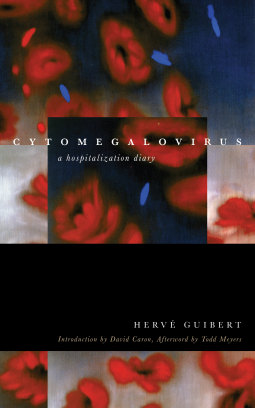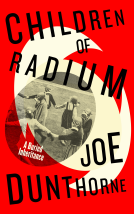
Cytomegalovirus
A Hospitalization Diary
by Hervé Guibert, Todd Meyers
This title was previously available on NetGalley and is now archived.
Send NetGalley books directly to your Kindle or Kindle app
1
To read on a Kindle or Kindle app, please add kindle@netgalley.com as an approved email address to receive files in your Amazon account. Click here for step-by-step instructions.
2
Also find your Kindle email address within your Amazon account, and enter it here.
Pub Date Oct 01 2015 | Archive Date Sep 01 2015
Description
narrative of the everyday moments of his hospitalization because of complications of AIDS. Cytomegalovirus is spare, biting, and anguished. Guibert writes through the minutiae of living and of death--as a quality of invention, of melancholy, of small victories in the face of greater threats--at the moment when his sight (and life) is eclipsed.
This new edition includes an Introduction and Afterword contextualizing Guibert's work within the history of the AIDS pandemic, its relevance in the contemporary moment, and the importance of understanding the quotidian aspects of terminal illness.
Advance Praise
“In
this medical humanities classic, the vulnerable yet unabashedly confrontational
Hervé Guibert dissects the solitary hospital body that he and unknown others
have become exam after exam, drug after drug, humiliation after humiliation,
scream after scream. The writer’s urgent will to live and poignant desire to
invent relations inside and outside the hospital are nothing short of
breathtaking.”—João Biehl, author of Vita: Life in a Zone of Social Abandonment
and Will to Live: AIDS Therapies and the Politics of Survival
“Like Roland Barthes’s Mourning Diary, Hervé Guibert’s hospitalization diary
speaks with moonlit clarity about the threshold between life and death; with
this heartbreaking and exemplary book Guibert has earned literary
immortality.”—Wayne Koestenbaum, Distinguished Professor of English, CUNY
“To read Guibert’s journal of faltering vision is to teeter at the portal to
many worlds. He stands, like Saramago, between light and darkness, right and
wrong, life and death. What he sees and hears there—what he learns—is timeless.
This book is a gift.”—David France, Director of How to Survive a Plague
Available Editions
| EDITION | Paperback |
| ISBN | 9780823268573 |
| PRICE | $19.95 (USD) |
Links
Average rating from 10 members
Featured Reviews
 Eleanor M, Reviewer
Eleanor M, Reviewer
In "To The Friend Who Did Not Save My Life" and its successors, Hervé Guibert lightly fictionalizes his experiences as a young man with AIDS, turning lived experience into art. "Cytomegalovirus" consists of Guibert's notes on a two-week hospital stay made a few months before he died in 1991. The reason for his stay is the eponymous cytomegalovirus which threatens his sight.
.
In "Cytomegalovirus" Guibert analyses his role as a patient, examining how, in the hierarchy of the hospital, he is a subordinate. His notes describe his resistance to this subordination and his desperate attempts to reassert his power and personhood. Although rawer than "To The Friend Who Did Not Save My Life", "Cytomegalovirus" is not entirely unmediated and there is a stark beauty to Guibert's words and his 'writing until the end'.
This Fordham University Press translation of "Cytomegalovirus" is accompanied by a personal introduction from David Caron and afterwords by Todd Meyers and translator Clara Orban. These place Guibert's hospital notes in context and assess their relevance and resonance, especially to an American readership, almost 25 years later.
Herve Guibert was a strong literary voice on AIDS in France and his writing is distinctive. I hadn't heard of Herve Guibert before reading this memoir but I was drawn to this book because it is memoir written during the AIDS crisis but from a European perspective.
Many of the journals and memoirs about HIV and AIDS come from the US: Paul Monette, Sean Strub, Dale Peck, George Whitmore, Fenton Johnson to name a few, all writing about the different ways in which they were affected. Loss and grief is always a strong theme in these memoirs. Either a pending death or a death of friends or loved ones. These memoirs make compelling reading because of the way HIV was ignored and because of the way people living with HIV were judged and stigmatised by Governments and societal institutions.
Still judged and still stigmatised.
Thirty-four years on from the onset of the AIDS pandemic Herve Guibert's writing resonates, not just because of AIDS but because of the way in which he had to struggle to be recognised as human within the hospital, an institution that was supposed to be seeking to heal and care for him.
In 1990 Herve Guibert was hospitalised for three weeks because of Cytomegaloviris. This is a form of herpes, normally harmless to healthy people but which killed a great number of people with AIDS, also causing blindness. When the author wrote this he had about two months to live and was admitted into hospital for an eye operation. It was hoped that the eye operation would help add some comfort to his life but the operation could also have left him blind.
Herve kept a journal about his stay in hospital and in this way witnesses not only about AIDS, but about the way in which hospitals can become dehumanising as patient care and recognition of the person becomes lost in the hospital processes. Under the pressure of work, some hospital staff, it seems, can forget that the patient is actually a person.
An example of this is when Herve has an ultrasound and is told by a doctor that he has 'a truly exceptional and very rare interior configuration.' The doctor then says that she will take some pictures for herself and for her assistant. I mean really? She doesn't ask permission, she just takes, forgetting that the person before her is a young man dying of a horrendous illness. In her eyes he is therefore a subject to be studied, not a person who is losing his life to a vicious disease. She only sees him from her perspective. She doesn't see him as human.
As a reader I found this journal to be both fascinating and courageous, but also worrying. It is worrying because France is supposed to have an excellent healthcare system and yet all these kinds of things were happening. Patient care was compromised by a distinct lack of compassion, creating a sense of powerlessness which Herve Guibert has managed to convey in his short writing.
It is fascinating and courageous because in this writing we see Herve Guibert's desire to live and his desire to be seen as a human being and not a specimen for further study. He was so ill and yet he managed to write this journal. It wrenches my heart when I think of what he went through.
And then there is the alarm. This isn't just an AIDS memoir. This is a prophetic call to health institutions and professionals to remember compassion and the need to treat people as human beings. Last month in the UK Healthwatch England published their report into hospital discharge. Thousands of people provided stories about the poor way in which they were treated in hospital and then discharged. It makes sobering reading that more than ten years after Herve Guibert's experience in France, similar attitudes and lack of compassion is being experienced by hospital patients in the UK.
Why do our caring institutions lack compassion? Perhaps this is the question to be asked.
Of course it is not every healthcare staff, nor is it every institution that is uncaring but it still makes worrying reading to see that some things just have not changed. And it doesn't matter whether it is AIDS, dementia or a broken leg. A lack of compassion is still a lack of compassion and has a way of undermining patient care, leaving the person feeling vulnerable.
And this sense of vulnerability and powerlessness is something Herve Guibert struggled against during his three weeks in hospital. AIDS was the reason Herve Guibert was in hospital and although treatment and care for people with HIV or AIDS related conditions has vastly improved there is still stigma and discrimination. There are still debates and arguments about prevention strategies and people are still being infected. People still die of Aids, albeit not in the catastrophic numbers of the early nineties, but a loss is still a loss.
In this memoir Herve mentions aspects of his impending death: the kind of funeral he would like, the need to write until the end. But he also writes about being a patient: that his room is dirty with old used bandages under the bed and he worries about whether he can trust his nurses. He has heard of a terrible story where some nurses had killed elderly people in their care and this concerns him. Herve's writing shows us how fear can grip us when we are most vulnerable.
His writing reminds me why I hate hospitals: bright light, constant noise, sometimes impersonal care.
' A hospital stay is like a long voyage with an uninterrupted parade of people, of deliveries, or of rituals to pass the time. There isn't even any more night. Hospitals are hell.'
How right he was.
Herve can hear the conversation of some of the nurses mocking him. Mocking his complaints despite the fact that he is a seriously ill and dying man. He recognises very quickly who are the heroes amongst the medical staff and who are the villains.
Herve very much sees himself as against the hospital as an institution. AIDS is ravaging his body and he needs to fight against that, but he also needs to fight for respect and fight to be recognised as a human being by the institution that is joining him in the struggle to keep him alive.
The part that really touched me is at 70% where he has had the operation and mentions the orderly who bathed him and was kind to him. This contrasts with the nurse who he challenges for being unkind. I find this heartbreaking not just because it happened to Herve but because these things still happen today.
Herve's short memoir is striking in its relevance for healthcare professionals and patients today.
I think healthcare is challenging and stressful and some medical and caring staff receive quite low salaries for what they do (here in England), but I think there is a need for personal ethics and integrity. If healthcare staff feel so beaten and worn down that they cannot show compassion it is time then to find another job.
As individuals we are not bound or forced to practice the profession for which we trained. We have freedom to change jobs and careers, and we should change if we can no longer serve compassionately.
In his writing Herve does not identify that his treatment is related to discrimination or stigma. It is simply a matter of the patient versus the institution. Whilst he does not observe Aids related discrimination it doesn't make the reader feel any better because whilst Aids may not affect all of us, hospital care does. Herve Guibert very articulate. Even though he was seriously ill he still managed to push back against poor practice and the lack of compassionate care. What about the patients that couldn't? Why must vulnerable people bear the cost of pressurised hospitals and stressed hospital staff?
Herve's memoir is supported by a foreword written by David Caron. The foreword highlights the imporatnce of Herve's writing for us today especially now that the AIDS crisis is passing into history. He emphasises that although the crisis might be history the disease hasn't changed and is still around. People are still being infected. People are still dying. David Caron see this memoir as a ways of engaging people today and reminding society that we still need structures in place to support people and we should still have discourse on AIDS.
I think this is a thoughtful and poignant piece of writing which speaks to its time, but also continues to speak on contemporary issues.
Well worth reading.
Copy provided by NetGalley in exchange for a review.
 Tina F, Educator
Tina F, Educator
Got an advanced reading copy from NetGalley for an honest review.
Wonderfully intimate. Way too short for me. Reminded me os a Solschenizyn's Cancer ward.
 Irene A, Reviewer
Irene A, Reviewer
This is the diary of the hospitalisation of Herve Guibert because of an eye infection. He died of AIDS in France at the age of 36 in 1991. It also includes Todd Meyer's experience with AIDS too. It seems as if hospitals are pretty much the same with the mix of good, kind people and those who are not so nice. Such a shame how too many of the staff treated him like an object, not a person who has hopes, dreams and feelings. It made me feel shame on their behalf. It is to be hoped that lessons have been learnt since those days. A poignant and thought provoking book.
Readers who liked this book also liked:
Jodi Picoult; Jennifer Finney Boylan
General Fiction (Adult), Literary Fiction, Women's Fiction


















